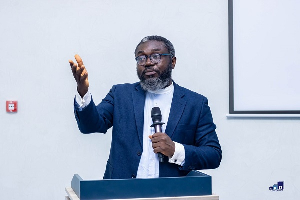Barker-Vormawor to NDC: ‘You’re Repeating NPP’s Fatal Mistakes’
In the ever-dynamic political landscape of Ghana, opposition and ruling parties often find themselves locked in fierce battles over governance philosophies, development strategies, and national progress. Recently, Barker-Vormawor, a notable political commentator and voice within the Ghanaian political discourse, has issued a stark warning to the National Democratic Congress (NDC), accusing the party of repeating the “fatal mistakes” historically attributed to the New Patriotic Party (NPP).

This accusation is not just a casual political jab but a critical reflection on the trajectory of Ghana’s governance, policy implementation, and political culture. It invites both parties and the Ghanaian electorate to scrutinize the patterns set by ruling administrations and the consequences borne by ordinary citizens.
Context: The Political Backdrop
The NPP and the NDC, Ghana’s two major political parties, have alternated in power since the country’s return to democratic rule in 1992. Each party has its ideologies, development agendas, and governance styles that they promise to implement when elected. Historically, the NPP has been criticized at times for economic management issues, perceived elitism, and policy inconsistencies that some claim have hampered Ghana’s development path.
Barker-Vormawor’s statement emerges from a growing concern that the NDC, poised either as a ruling party or a strong opposition, is beginning to mirror some of the very mistakes the NPP was faulted for—mistakes that, according to him, have been “fatal” to Ghana’s socio-economic fabric.
What Are These Fatal Mistakes?
Barker-Vormawor highlights several core areas where he believes the NDC is falling into the same traps as the NPP:
1. Economic Mismanagement
One of the biggest criticisms leveled against the NPP during its tenure has been on handling the economy, particularly issues related to debt accumulation, inflation, and public spending. The NDC, according to Barker-Vormawor, is mimicking these errors by failing to institute strong fiscal discipline, leading to unsustainable debt levels that threaten economic stability.
He points to increasing government expenditures without commensurate revenue generation, which places undue strain on future budgets and affects essential social services. This reckless spending mirrors what many saw as the NPP’s approach during its periods in office, which often resulted in budget deficits and inflationary pressures on the populace.
2. Ignoring Structural Reforms
Structural reforms in governance, public sector efficiency, and economic diversification have been areas where both parties have promised progress but have often delivered little. Barker-Vormawor warns that the NDC is failing to learn from the NPP’s shortcomings in these areas, continuing to rely on the same old frameworks that stifle innovation and long-term growth.
He emphasizes the need for a break from the status quo with bold reforms that transcend party politics, focusing on sustainable projects that create jobs and reduce poverty.
3. Political Patronage and Corruption
Both the NPP and the NDC have faced allegations of political patronage and corruption, which have eroded public trust in democratic institutions. Barker-Vormawor’s critique underscores that the NDC appears to be repeating the NPP’s errors by tolerating or engaging in corrupt practices, nepotism, and favoritism, which undermine good governance and equitable development.
This cycle of corruption, he argues, must be broken to restore confidence in political leadership and governance structures.
4. Lack of Clear Vision and Consistency
Barker-Vormawor also accuses the NDC of lacking a clear, cohesive vision for Ghana’s future, a criticism often previously aimed at the NPP. Policy inconsistency and frequent changes in strategic direction create uncertainty among investors, citizens, and international partners. Without a steadfast vision and consistent implementation, Ghana risks stagnation regardless of which party is in power.
The Bigger Picture: What This Means for Ghana
The repetition of these “fatal mistakes” by the NDC, according to Barker-Vormawor, signals a troubling trend where political rivalry overshadows national interest. When both major parties echo the same failings, the electorate’s ability to effect meaningful change through their vote diminishes. This cyclical problem hampers Ghana’s potential to achieve sustainable development, poverty reduction, and improved standards of living for its citizens.

Calls for Accountability and Reform
Barker- Vormawor’s message is ultimately a call to action—not just for the NDC but for all political actors and stakeholders in Ghana. He advocates for:
Accountability: Both parties must be held accountable for their governance records, with rigorous scrutiny from the media, civil society, and the electorate.
Policy Learning and Adaptation: Political parties must learn from past mistakes, abandoning ineffective policies and embracing innovative, evidence-based approaches to governance.
Focus on National Unity: Moving beyond partisan politics to prioritize national development and cohesion.
Strengthened Institutions: Building strong democratic and economic institutions that operate transparently and independently from political interference.
Conclusion
Barker-Vormawor’s cautionary statement to the NDC serves as a powerful reminder that Ghana’s political progress depends on the ability of its leaders to break free from the cycles of error that have historically limited the country’s growth. The repetition of the New Patriotic Party’s fatal mistakes by the National Democratic Congress threatens to stall Ghana’s advancement and deepen the socio-economic challenges faced by its people.
For Ghana to realize its full potential, it requires visionary leadership committed to learning from history, embracing reform, and putting the welfare of all Ghanaians above party interests. The time for repeating mistakes is over; the time for transformative governance is now.